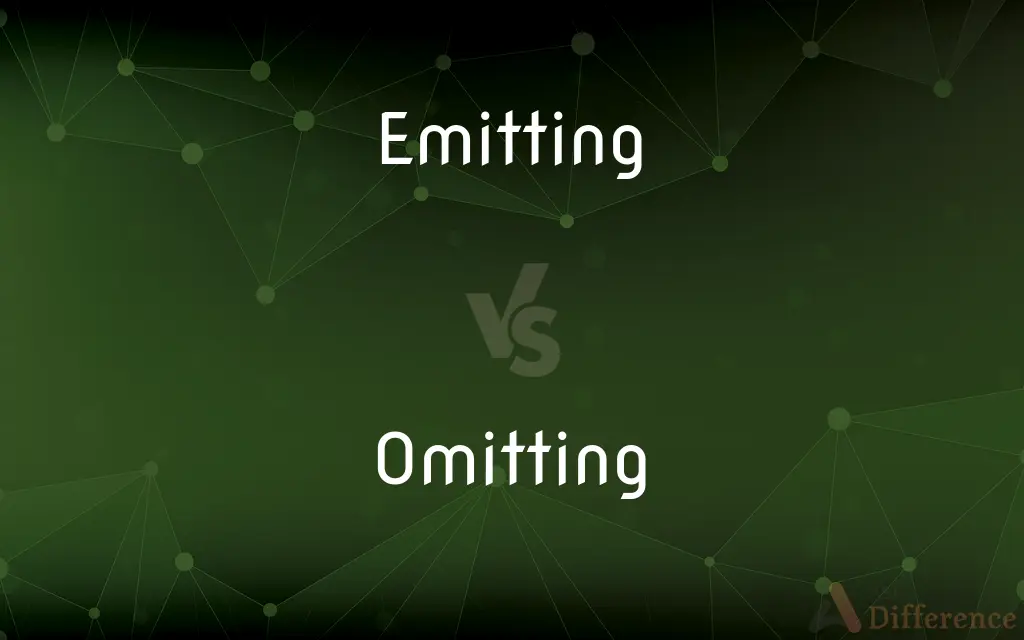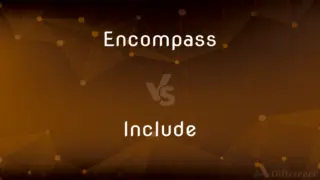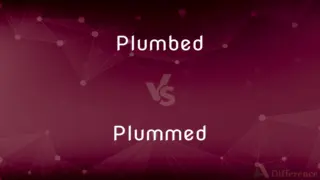Emitting vs. Omitting — What's the Difference?
By Tayyaba Rehman & Urooj Arif — Updated on April 8, 2024
Emitting involves releasing or sending out something, such as light or sound, while omitting means leaving something out or not including it.

Difference Between Emitting and Omitting
Table of Contents
ADVERTISEMENT
Key Differences
Emitting is the process of producing and releasing something, such as light, sound, heat, or a specific substance, into the surrounding environment. It implies an active release of something from a source. For example, a light bulb emits light, and a speaker emits sound. On the other hand, omitting involves intentionally or unintentionally excluding something from a list, conversation, document, or another form of communication. It suggests that something that could have been included has been left out, like omitting a key fact from a report or leaving someone's name off an invitation list.
When something is emitted, it typically moves from the source into the surrounding area or medium, becoming part of the environment or being detected by senses or instruments. This can include emissions that are beneficial, harmful, or neutral in their effects. Whereas, when something is omitted, it is not transmitted, shared, or made part of the final output or product. This act of omission might be due to oversight, intention, or necessity, resulting in something being absent that might have been expected to be present.
In the context of environmental science, emitting refers to the release of substances into the atmosphere, like carbon dioxide emissions from vehicles or factories, which have significant implications for climate change and air quality. Omitting, in similar discussions, might involve not including specific data in a study, leaving out an impactful factor in an environmental impact assessment, or neglecting to mention a pollutant in a report.
In literature and communication, emitting could be seen in the context of characters or narrators expressing thoughts, feelings, or narrations, thereby adding to the richness and depth of the narrative. Omitting, conversely, plays a crucial role in creating suspense, mystery, or focusing the audience's attention on certain details while excluding others, which can significantly alter perception and interpretation.
In legal and ethical discussions, the distinction between emitting and omitting can also imply responsibility and accountability. Emitting harmful substances or information might require regulation, mitigation, or remediation efforts. On the flip side, omitting important information or failing to include necessary warnings or instructions can lead to legal consequences, ethical dilemmas, or both, highlighting the significance of what is not said or done just as much as what is.
ADVERTISEMENT
Comparison Chart
Definition
The act of producing and releasing something.
The act of leaving something out.
Examples
Light from a bulb, sound from a speaker.
Excluding a fact from a report.
Contexts
Environmental science, physics, communication.
Literature, communication, documentation.
Effects
Can be beneficial, harmful, or neutral.
Results in absence or exclusion.
Implications
Related to environmental impact, detection.
Involves oversight, mystery, focus.
Compare with Definitions
Emitting
Releasing substances into the environment.
Factories emitting pollutants into the air are under scrutiny.
Omitting
Skipping or bypassing in a sequence or list.
When baking, she realized she had omitted an important ingredient.
Emitting
To send out light, sound, or substances.
The firefly emits a soft glow in the dark.
Omitting
Intentionally or accidentally excluding.
The invitation omitted several key guests by mistake.
Emitting
Expressing or conveying information.
The actor emits a range of emotions through his performance.
Omitting
Leaving out or excluding something.
Omitting relevant details from the story changes its understanding.
Emitting
Producing and discharging.
The speaker emits sound waves that can be heard across the room.
Omitting
Failing to include or mention.
The report was criticized for omitting critical data.
Emitting
To give off energy in the form of radiation.
The sun emits a vast range of electromagnetic radiation.
Omitting
Not performing or displaying.
The software update omits previously available features.
Emitting
To give or send out (matter or energy)
Isotopes that emit radioactive particles.
A stove emitting heat.
Omitting
To fail to include or mention; leave out
Omitted an important detail from the report.
Emitting
To give out as sound; utter
"She emitted her small strange laugh" (Edith Wharton).
Omitting
To fail or neglect to do (something)
Omitted his daily walk during our visit.
Emitting
To voice; express
Emit an idea.
Omitting
To fail or neglect (to do something)
I omitted to mention that I don't eat meat.
Emitting
To issue with authority, especially to put (currency) into circulation.
Omitting
Present participle of omit
Emitting
Present participle of emit
Omitting
An act of omission.
Emitting
Giving off light or heat or radiation; as, the physical temperature of the emitting material.
Emitting
Giving off light or heat or radiation;
The physical temperature of the emitting material
Common Curiosities
What is the fundamental difference between emitting and omitting?
Emitting is about releasing or sending out, while omitting is about excluding or leaving out.
Can both emitting and omitting have environmental impacts?
Yes, emitting can directly impact the environment by releasing substances, whereas omitting important environmental data can lead to inadequate responses to issues.
Can omitting be a strategic decision?
Yes, omitting can be strategic in focusing attention, creating suspense, or simplifying messages.
How do emitting and omitting affect communication?
Emitting enhances communication by adding information or expressions, while omitting can either streamline messages or create misunderstandings by leaving out details.
How does emitting relate to responsibility and accountability?
Entities that emit pollutants or harmful information are often held accountable for their actions and may be responsible for mitigation efforts.
How can omitting information be harmful in scientific research?
Omitting data can lead to incomplete or misleading conclusions, affecting the credibility of the research and its implications.
Is omitting always negative?
No, omitting is not always negative; it can be used effectively to streamline communication or emphasize certain aspects over others.
What role does technology play in controlling emissions?
Technology plays a crucial role in monitoring, reducing, and controlling emissions through various mitigation and filtration systems.
What are some methods to reduce emissions?
Methods include adopting renewable energy sources, improving energy efficiency, and implementing stricter environmental regulations.
Why is it important to understand the distinction between emitting and omitting in legal contexts?
Understanding these terms is crucial as emitting harmful substances or omitting vital information can lead to legal repercussions.
How do artists use the concept of omitting in their work?
Artists might omit certain details to draw focus to the central theme of their work or to evoke curiosity and interpretation from the viewer.
What are the consequences of emitting greenhouse gases?
Emitting greenhouse gases contributes to global warming and climate change, leading to severe environmental and socio-economic impacts.
Can the act of omitting be unintentional?
Yes, omitting can be unintentional, often resulting from oversight or human error, but it can still have significant consequences.
Why might a writer choose to omit certain details from a narrative?
A writer might omit details to streamline the story, focus on specific themes, or leave space for readers’ interpretations and imaginations.
How is omitting used in storytelling?
In storytelling, omitting details can create suspense or allow the audience to fill in gaps with their imagination, enriching the narrative experience.
Share Your Discovery

Previous Comparison
Encompass vs. Include
Next Comparison
Plumbed vs. PlummedAuthor Spotlight
Written by
Tayyaba RehmanTayyaba Rehman is a distinguished writer, currently serving as a primary contributor to askdifference.com. As a researcher in semantics and etymology, Tayyaba's passion for the complexity of languages and their distinctions has found a perfect home on the platform. Tayyaba delves into the intricacies of language, distinguishing between commonly confused words and phrases, thereby providing clarity for readers worldwide.
Co-written by
Urooj ArifUrooj is a skilled content writer at Ask Difference, known for her exceptional ability to simplify complex topics into engaging and informative content. With a passion for research and a flair for clear, concise writing, she consistently delivers articles that resonate with our diverse audience.














































